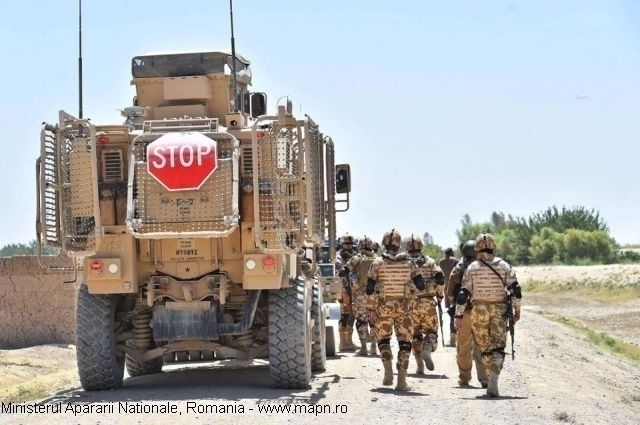End of mission in Afghanistan
In agreement with its partners in the Alliance, Romania decided to withdraw its forces from Afghanistan

Corina Cristea, 09.07.2021, 14:00
US troops intervened in Afghanistan almost 20 years ago, shortly after the terrorist attacks on the New York twin towers and the Pentagon. Accused of providing refuge for Osama bin Laden and the jihadist network Al Qaeda, responsible for the attacks, the Taliban were removed from power by Americans. Almost two decades followed in which NATO forces acted in the region through various missions, marked by numerous attacks resulting in loss of human lives.
But then, in April this year, the US president Joe Biden said that with the terror threat now in many places, keeping thousands of troops grounded and concentrated in just one country at a cost of billions each year makes little sense to me and to our leaders. (…) It is time to end America’s longest war. It is time for American troops to come home.
The United States will work with its NATO allies for a coordinated withdrawal from the Asian country, according to the principle established from the beginning: we enter together, we adapt together, and we leave together. Subsequently, the North Atlantic Alliance announced that the necessary conditions for the completion of its Resolute Support mission in Afghanistan had been met and it was no longer necessary to maintain the 9,600 soldiers from 36 countries.
Romania is part of the coalition against terrorism, the first Romanian military being deployed in Afghanistan shortly after the attacks, and since then it has been constantly among the main contributors to the NATO mission. In agreement with its partners in the Alliance, Romania decided to withdraw its forces from Afghanistan in coordination with the other members starting with May 1, 2021, a decision which was made by the country’s Supreme Defense Council.
The mission in Afghanistan will end for the Ministry of Defence only when all Romanian soldiers have returned home safe, Defence Minister Nicolae Ciuca said:
As one of the most important contributors to the Resolute Support Mission, with over 600 soldiers deployed in the theatre of operations, Romania will act in accordance with the allied decisions regarding the withdrawal schedule. Romania took the decision, two decades ago, to be part of the counter-terrorism coalition and to join its strategic allies, in an international bid to fight an enemy that threatens the peace and security of its citizens. For almost 20 years, tens of thousands of Romanian soldiers have fulfilled missions in the Afghan theatre of operations, contributing significantly to the change for the better of the security situation in the area.
We are talking here about two missions. The first was the International Security Assistance Force (ISAF), followed in 2015 by Resolute Support, which aimed to train, advise and assist the Afghan National Security Forces. Invited to Radio Romania, Nicolae Ciucă, commander of the first Romanian battalion in Afghanistan, drew a picture of the situation from Romania’s perspective:
For the Romanian Army, the year 2002 meant hope and efforts towards being invited to join the alliance in the autumn of that year, which happened. Two years on, the Romanian Army kept fulfilling its missions in Afghanistan, but also in Iraq and became a full member of the North Atlantic Alliance based on the decision made at the NATO summit. Therefore, all these elements of analysis can be described first of all by the will, enthusiasm and the spirit to prove that we were able and had the availability, the human resources and, why not, the spirit of sacrifice necessary to become members of the North Atlantic Alliance. After that, we have proven we are a credible member of this alliance. And because I mentioned sacrifice, I want to recall and express our gratitude for the 27 Romanian soldiers who lost their lives in Afghanistan and the over 200 people who got wounded there. This is the effort that the Romanian army have made in these 20 years.
What does Afghanistan look like now and to what extent have the problems been resolved? Afghanistan is still not a perfect country, but it does not compare to the Afghanistan of beheadings and torture two decades ago. Afghanistan now has dozens of diplomatic missions around the world, a Constitution, a legally elected president and government, an elected parliament and local councils in which women are represented as well. Parties, NGOs and civil society organisations have been re-established. Most Afghans have access to basic health care, and millions of children are vaccinated against epidemic diseases. However, huge challenges remain related to government, drugs, poverty and corruption. The future is still uncertain.
Here is Liviu Mureşan, president of the EURISC Foundation:
After two decades, this operation that has cost so many human lives, huge amounts of money and has left the problem unresolved, is coming to an end. We do not know how things will develop in the coming period. It is very important that we, who have been involved in this operation in Afghanistan from the very beginning, have all our soldiers back home, along with all the related equipment, if possible. Afghanistan will remain a lesson in how infrastructure determines the fate, life and proper functioning of a mission. A country that has no access to the sea is a country that cannot be conquered, controlled and truly transformed, especially with the geography that Afghanistan has.
The Speaker of the Afghan Parliament, Mir Rahman Rahmani, has warned that the withdrawal of foreign troops from the country in the current context will lead to civil war. (MI)






























